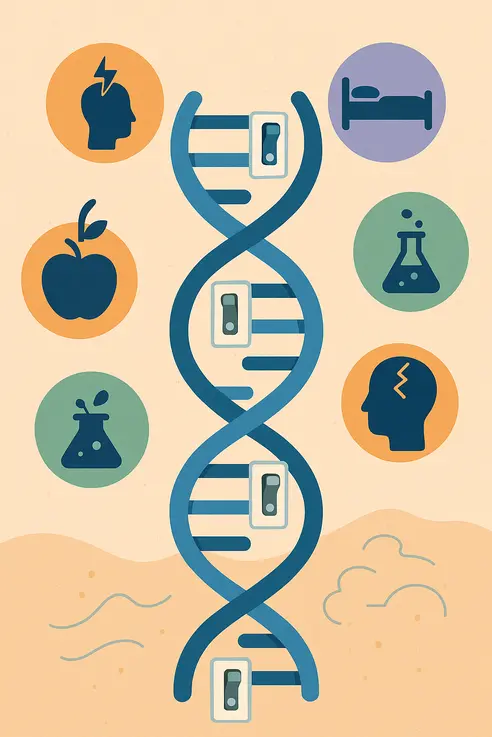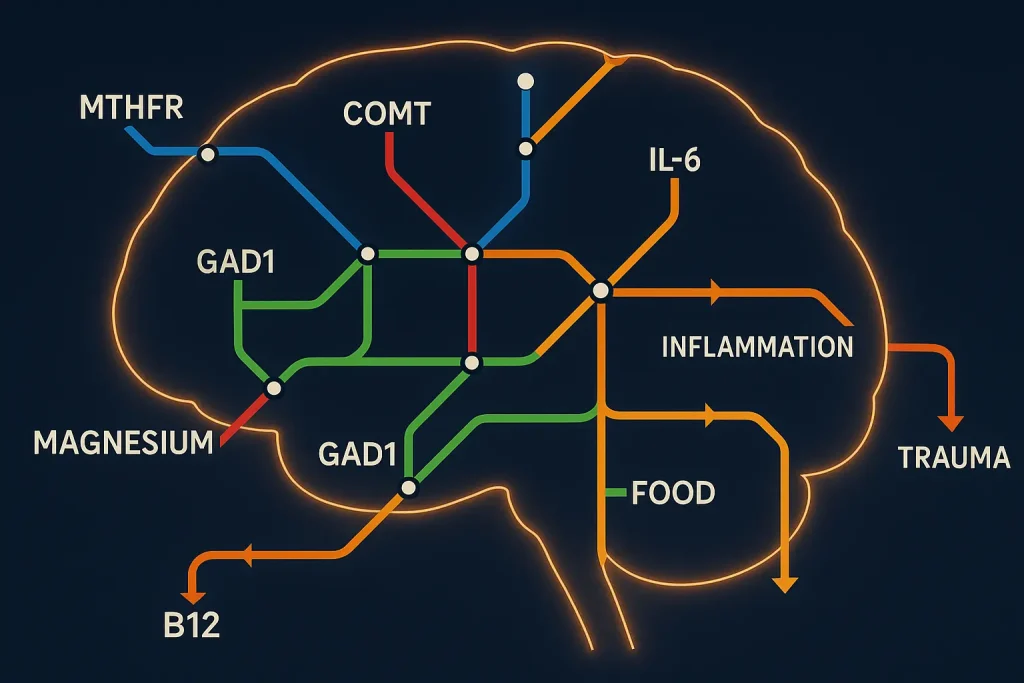I used to believe what most parents are told when their child is diagnosed with a neurological condition: “There’s nothing you can do—just wait it out or medicate the symptoms.”
When my son was diagnosed with a tic disorder over a decade ago, I was told it was something he might grow out of, or we could try medications, often meant for blood pressure or seizures, that wouldn’t actually fix the root problem.
But something inside me said, no. I couldn’t write him off like that. And I’m so glad I didn’t.
Instead, I went back to school. I relearned everything I thought I knew about health and wellness. And what I discovered changed our lives.
Key Takeaways
-
Epigenetics demonstrates how environmental factors influence gene expression, facilitating customized strategies to address conditions such as tic disorders, ADHD, and anxiety.
-
Comprehensive genetic testing identifies specific biological imbalances, providing a data-driven framework for tailored dietary, supplemental, and lifestyle interventions.
-
Chronic inflammation, often triggered by environmental factors and genetic predispositions, drives many neurological conditions; mitigating it is critical for symptom relief.
-
Standard pharmacological treatments for tic disorders and ADHD frequently fail to address underlying causes, whereas functional medicine prioritizes holistic, sustainable healing.
-
Genomic insights support individualized care for both children and adults, empowering families to address chronic conditions through evidence-based, root-cause approaches.
Table of Contents
What is Epigenetics, Really?
Epigenetics is the study of how your environment influences your genes. Yes, we’re all born with a genetic blueprint—but those genes aren’t destiny.
Think of your genes as light switches. Epigenetics is what determines whether those switches are turned on or off. Factors such as stress, toxins, diet, sleep, and trauma all influence how our genes are expressed.
So many people hear the word “genes” and feel overwhelmed. But the truth is, we have so much more control than we’re led to believe.
We can influence how our genes behave
Why Genetic Testing Matters More Than Ever
Some people will tell you, “Just change your lifestyle. You don’t need genetic testing.”
And sure—changing your environment can help. But here’s what I’ve seen over and over in my practice: genetic testing gives us a roadmap.
It helps us see exactly how a child’s environment is affecting their biology—and what specific steps we can take to restore balance. I’ve watched the lightbulb go on for so many parents when they see their child’s results and realize, “Oh, now I understand why this matters.”
This clarity helps families become more engaged and more hopeful because the plan isn’t random. It’s rooted in data. It’s designed for your child.

How Genetic Testing Changed My Son’s—and My Own—Life
When my son was first diagnosed, I was desperate to understand what was going wrong. Traditional medicine wasn’t helping, and I didn’t want to rely on symptom-masking medication. So we ran genetic tests.
The results helped us pinpoint key factors—like his B12 metabolism and inflammation pathways—that were completely out of balance. When we adjusted his diet, added targeted supplements, and reduced inflammatory triggers, everything began to change.
The tics started to disappear. His mood and sleep improved. He came back to life.
I was so blown away by his transformation that I decided to run my own genetic tests. I’d battled lifelong anxiety, low energy, and even tried a vegan diet that nearly broke me. It turns out I also had B12 absorption issues—no matter how much red meat I ate, I wasn’t metabolizing it properly.
Without that insight, I would’ve kept spinning my wheels. That’s why I believe in this work with every fiber of my being.
Why One Gene (Like MTHFR) Isn’t the Whole Story
You’ve probably heard of MTHFR—the “hot sexy gene” that everyone panics about.
And yes, it plays a role in methylation, detoxification, and neurotransmitter health. But it’s just one piece of a complex puzzle.
When I evaluate someone’s DNA, I’m not looking at five SNPs (single-nucleotide polymorphisms). I’m looking at the whole picture, because everything is connected.
We look at genes that affect:
-
- Inflammation (like IL-6, TNF, CTLA-4)
-
- Neurotransmitter production (GAD1, COMT, MAOA/B)
-
- Detox pathways
- Detox pathways
-
- Nutrient absorption
- Nutrient absorption
-
- Hormone regulation
- Hormone regulation
All of these genes interact—and they’re influenced by what’s happening in your child’s environment.
Explore how we use genetic testing and functional labs together.
The Role of Inflammation and Broken “On/Off” Switches
One of the biggest issues I see in kids with tic disorders and ADHD is chronic inflammation—often driven by environmental triggers and poor detoxification.
Imagine you have broken “off switches” in your genes. That means when your child gets exposed to something (like gluten, illness, or stress), their body can’t calm down. It’s like pouring lighter fluid on a fire—it burns hotter, longer, and harder than it should.
With the right data, we can identify these broken switches—and make smart changes to reduce the flame.
This might include:
-
- Removing inflammatory foods
-
- Supporting gut health
-
- Calming the nervous system
-
- Supplementing with targeted nutrients (like sublingual B12)
We’re not guessing. We’re solving the root cause.
Why Medications Alone Won’t Fix Tics or ADHD
When it comes to tic disorders, the conventional medical approach is… disappointing.
Most parents are told to “ignore it” or accept that it might get worse. And if the tics become severe? The only option offered is medication, usually drugs meant for seizures or high blood pressure.
However, studies, such as those from Cincinnati Children’s Hospital, show that these medications rarely reduce symptoms by more than 50%. And they don’t address the root cause.
I believe families deserve better. I believe your child deserves better.
That’s why I created the Tic Disorder Institute—to offer families an alternative that works. We focus on healing from the inside out, using functional medicine, genomic insights, and personalized support.
👉 Learn more about our programs for families.
Yes, This Works for Adults Too
I primarily work with children, but I often find myself working with their parents as well. Once they see the fantastic results their child is experiencing, they ask, “Can you help me too?”
Absolutely.
So many parents have been living with anxiety, fatigue, poor sleep, or digestive issues for years, and they’ve normalized it. But once they understand how their genes are expressed (and how to support them), everything changes.
Sometimes, it’s as simple as removing one food or switching out a supplement. At other times, it means shifting your entire approach to stress, sleep, or physical activity.
Either way, I’ll help you build a plan that works for your body.
Is Genetic Testing Worth It?
I get this question all the time—especially from families who’ve already spent thousands of dollars on appointments, tests, and supplements.
Here’s my honest answer: Yes. It’s worth it.
Genetic testing gives you a lifelong roadmap. It helps you stop guessing. It enables you to take action that aligns with your child’s unique biology. You won’t regret having that level of clarity—it’s something you can return to again and again.
Your Child’s Symptoms Are Not the End of the Story
Whether your child has been diagnosed with Tourette’s, ADHD, PANS/PANDAS, or “just” anxiety, I want you to know that those symptoms are a signal, not a sentence.
They’re your child’s check engine light.
With the right tools, we can open the hood, take a look underneath, and begin making fundamental changes.
You don’t have to stay stuck. You don’t have to feel helpless. There is a better path.
And I’d be honored to help you find it.
👉 Book your free discovery call today to learn how we can work together.
This blog post was inspired by my conversation with Susan Robbins on her podcast, Everyday Epigenetics: Raw. Real. Relatable.
🎧 To listen to the full conversation, click here to tune into the episode.
References:
Equils, O. (2012). What Causes ADHD. Aap Grand Rounds, 27, 72-72. https://doi.org/10.1542/GR.27-6-72.
Poh, W., Payne, J., Gulenc, A., & Efron, D. (2018). Chronic tic disorders in children with ADHD. Archives of Disease in Childhood, 103, 847 – 852. https://doi.org/10.1136/archdischild-2017-314139.
Lee, I., Lee, J., Lim, M., & Kim, K. (2021). Comparison of Quantitative Electroencephalography between Tic Disorder and Attention-Deficit/Hyperactivity Disorder in Children. Clinical Psychopharmacology and Neuroscience, 19, 739 – 750. https://doi.org/10.9758/cpn.2021.19.4.739.
Gadow, K., Roohi, J., Devincent, C., Kirsch, S., & Hatchwell, E. (2009). Association of COMT (Val158Met) and BDNF (Val66Met) Gene Polymorphisms with Anxiety, ADHD and Tics in Children with Autism Spectrum Disorder. Journal of Autism and Developmental Disorders, 39, 1542-1551. https://doi.org/10.1007/s10803-009-0794-4.
Frequently Asked Questions
Epigenetics is the study of how environmental factors—such as diet, stress, toxins, and sleep—influence gene expression without altering DNA. For children with conditions like tic disorders, ADHD, or anxiety, understanding epigenetic interactions allows for personalized interventions that address root causes, promoting lasting improvements in brain and body function.
Genetic testing provides a detailed analysis of genetic variations, such as those affecting inflammation, detoxification, or nutrient metabolism. This data creates a tailored roadmap for interventions, including dietary adjustments, targeted supplements, and lifestyle changes, ensuring treatments align with your child’s unique biology for optimal outcomes.
While lifestyle improvements can benefit overall health, genetic testing offers precise insights into how a child’s biology responds to environmental triggers. This clarity eliminates guesswork, enabling specific, effective strategies that address underlying imbalances, making it a valuable tool for complex conditions.
Key factors include a nutrient-rich diet free of inflammatory foods, consistent sleep schedules, stress management techniques, and minimizing exposure to toxins like pesticides or heavy metals. These align with epigenetic principles to optimize how genes related to brain health and inflammation function.
Chronic stress, such as from family tension or overscheduling, can activate genes linked to inflammation and impair those regulating mood and focus. Creating a calm home environment with routines and open communication can mitigate these effects, complementing epigenetic interventions.
The gut-brain axis influences gene expression related to inflammation and neurotransmitter production. Poor gut health, often due to diet or antibiotic overuse, can exacerbate symptoms of tics or ADHD. Epigenetic care often includes gut-healing protocols to support overall neurological wellness.

